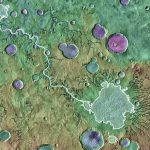Scientists discover our solar system’s fastest-orbiting asteroid
The Sun has a new neighbor that was hiding in plain twilight.
An asteroid that orbits the Sun in just 113 days—the shortest known orbital...
Scientists discover new tardigrade fossil in 16-million-year-old amber
Tardigrades, also known as water bears, are a diverse group of charismatic microscopic invertebrates that are best known for their ability to survive extreme...
Pluto’s atmosphere is disappearing, shows study
When Pluto passed in front of a star on the night of August 15, 2018, a Southwest Research Institute-led team of astronomers had deployed...
Some of the Moon’s craters are so dark, it takes ai to see what’s...
There is no dark side of the Moon.
But there are dark spots on it – specifically at the bottom of craters that are never...
Rogue planets could be habitable, shows study
The search for potentially habitable planets is focused on exoplanets—planets orbiting other stars—for good reason.
The only planet we know of with life is Earth...
‘Mini psyches’ give insights into mysterious metal-rich near-earth asteroids
Metal-rich near-Earth asteroids, or NEAs, are rare, but their presence provides the intriguing possibility that iron, nickel and cobalt could someday be mined for...
Scientists may have discovered first planet to orbit 3 stars
In a distant star system — a mere 1,300 light years away from Earth — UNLV researchers and colleagues may have identified the first...
‘Planet confusion’ could slow Earth-like exoplanet exploration
When it comes to directly imaging Earth-like exoplanets orbiting faraway stars, seeing isn’t always believing.
A new Cornell study finds that next-generation telescopes used to...
New telescope will explore the potential for life around our galaxy’s smallest stars
When the world’s most powerful telescope launches into space this year, scientists will learn whether Earth-sized planets in our ‘solar neighborhood’ have a key...
Mars’ surface shaped by fast and furious floods from overflowing craters, shows study
On Earth, river erosion is usually a slow-going process.
But on Mars, massive floods from overflowing crater lakes had an outsized role in shaping the...










